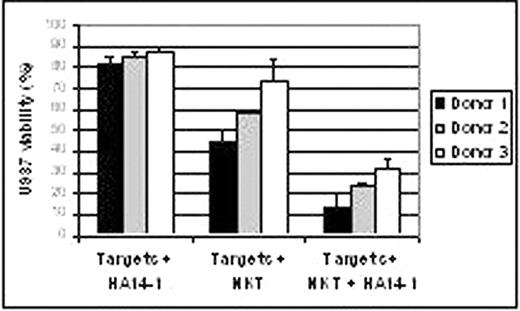Abstract
Invariant Vα24+ Vβ11+ NKT cells regulate immune responses and are capable of direct cytotoxic activity against tumour-cell targets mediated via the perforin/granzyme-B, Fas ligand and TRAIL pathways. A potential mechanism for tumours to escape immune killing is to block downstream apoptotic pathways by overexpression of the Bcl-2 oncoprotein. We therefore evaluated whether the Bcl-2-expressing U937 lymphoma line could be sensitized to NKT-cell cytotoxicity by coexposure to the HA14-1 small-molecule Bcl-2 inhibitor. Vα24+ NKT cells were purified from donor blood samples using magnetic beads and activated by exposure to KRN7000 and IL-2. U937 cells were labelled with the PKH26 membrane dye and then cocultured with activated NKT cells in a 10:1 or 20:1 effector: target ratio in U-bottomed 96-well plates. Cultures were performed in the presence or absence of HA14-1. After 4 hours, the cells were stained with annexin V-FITC and analysed by flow cytometry. Apoptotic and viable target cells were quantified as annexin-V positive and negative cells, respectively, in the PKH26-positive gate. Results of experiments on NKT cells derived from 3 donors are shown in the figure. Bars represent the mean percentage of viable U937 cells in triplicate assays and error bars indicate the SD. At the concentration of HA14-1 used, there was only minor single-agent cytotoxicity. However, a significant increase in U937 apoptosis was observed with the combination of HA14-1 and NKT cells compared to NKT cells alone. We conclude that the addition of the HA14-1 Bcl-2 inhibitor significantly increases the cytotoxicity of NKT cells against U937 lymphoma targets. This provides preliminary data supporting the possibility that the use of a combination of a small molecule inhibitor with immune therapy may increase the clinical efficacy of immune therapies that work via cytotoxic killing of malignant targets.
Author notes
Corresponding author


This feature is available to Subscribers Only
Sign In or Create an Account Close Modal